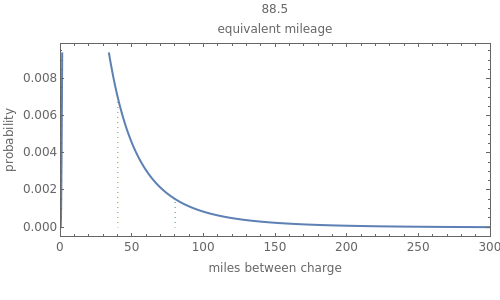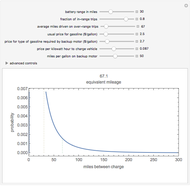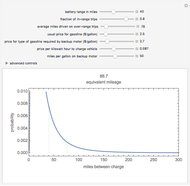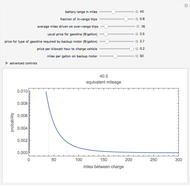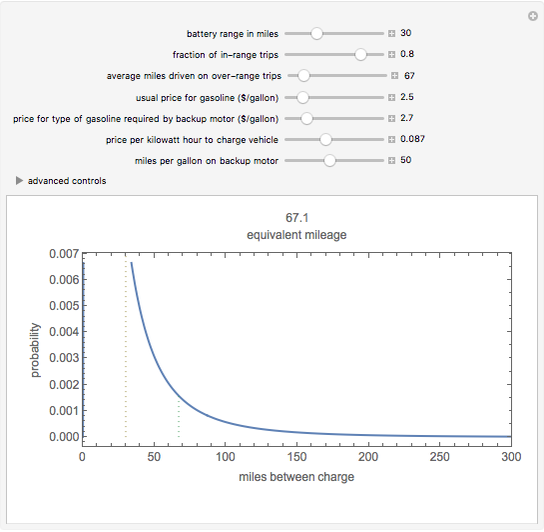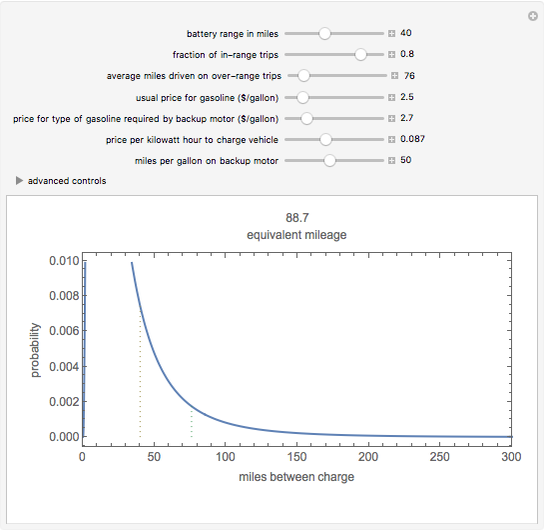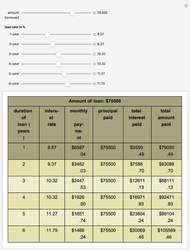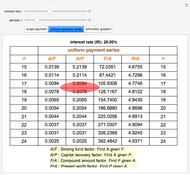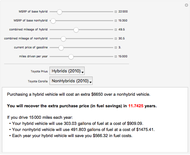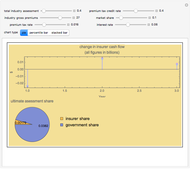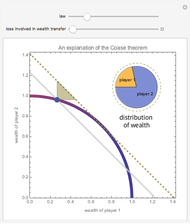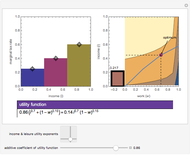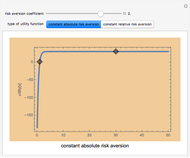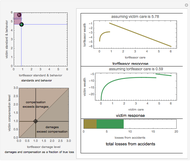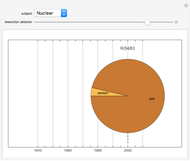The Equivalent Mileage of an Electric Vehicle with Backup Gasoline Propulsion

Requires a Wolfram Notebook System
Interact on desktop, mobile and cloud with the free Wolfram Player or other Wolfram Language products.
Cars such as the Chevrolet Volt use stored battery power to propel the car for a certain number of miles and then switch to a backup gasoline powered engine once the battery is exhausted. This Demonstration computes the equivalent miles per gallon of such cars. You input how many miles the car can go on a full charge (range), what percentage of times between full charges you drive less than the range, the average number of miles you drive on days you drive more than the range, the price per gallon of gas you would pay for a similar vehicle that was purely gasoline powered, the price per gallon of gas you pay to operate the backup gasoline motor, the miles per gallon the car gets when its backup gasoline motor is used, and the price per kilowatt hour you pay to charge the car. The Demonstration outputs the probability distribution of miles between charges it will use for its computations and the equivalent miles per gallon of the car.
Contributed by: Seth J. Chandler (April 2011)
Open content licensed under CC BY-NC-SA
Snapshots
Details
The United States Environmental Protection Agency (EPA) has rated the Chevrolet Volt as obtaining the equivalent of 93 miles per gallon when operated in electric mode for the first 35 miles, 37 miles per gallon for the remaining 344 miles when operated in gasoline-only mode. It has issued a "combined mileage rating" of 60 miles per gallon. One can replicate this combined mileage rating result and use no values known to be inconsistent with the EPA methodology by choosing parameters such as battery range in miles: 35; fraction of in-range trips: 0.23; average miles driven on over -range trips (143); usual price for gasoline: 3.20; price for type of gasoline required by backup motor: 3.20; price per kilowatt hour to charge vehicle: 0.11; miles per gallon on backup motor: 35. A copy of the EPA mileage sticker may be found at http://wot.motortrend.com/wp-content/blogs.dir/8/files/2011-chevrolet-volt-gets-official-epa-rating/29617811.jpeg.
Snapshot 1: temperature, use of accessories, and other factors may affect the range of such cars; a reduced range has a significant negative affect on equivalent gas mileage
Snapshot 2: equivalent mileage when the car is driven long distances on days it is driven more than the range
Snapshot 3: prices for electrical power differ significantly throughout the United States and throughout the world; a high price per kilowatt hour makes a significant difference in equivalent mileage; finding an economical power supplier is important to the economy of operating these cars
Snapshot 4: were gasoline prices to rise greatly relative to the price of electrical power, the equivalent mileage of these vehicles would increase significantly
Snapshot 5: as is often said, "your mileage may vary"; this snapshot shows the effects of reducing the mileage obtained when the backup gasoline motor is used
The default parameters are set using data for the Chevrolet Volt as provided at 2011 VOLT.
Advanced controls let you change the assumptions made by the manufacturer in computing the cost of fully charging the vehicle.

